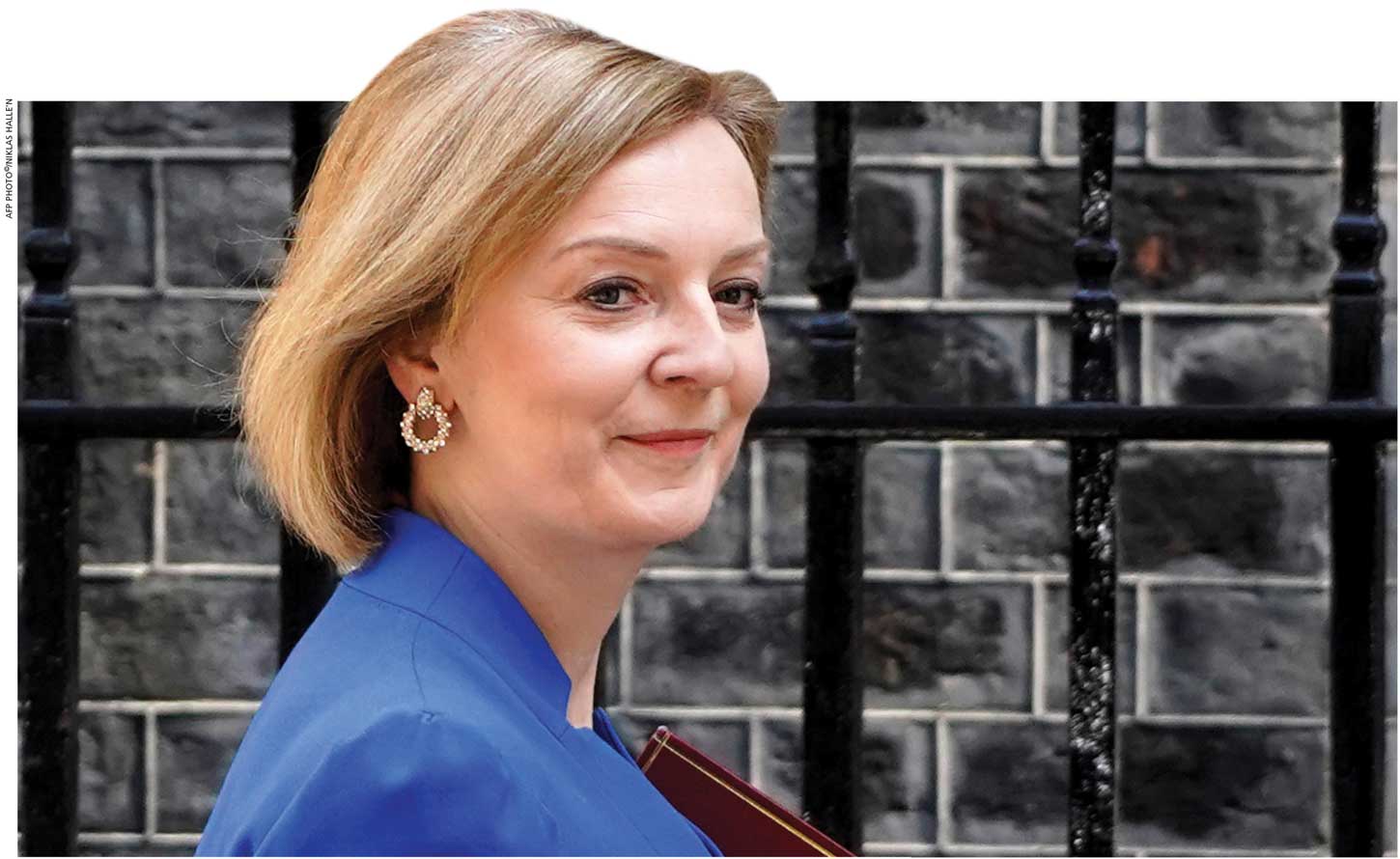BRITISH POLITICS
LIZ TRUSS’ IDEOLOGY BELIES REALITY
Saro Thiruppathy tries to comprehend the promises of the new prime minister of the UK in context of the crises facing the British people
On 5 September, Liz Truss was elected by 0.12 percent of the UK’s population (81,326 Conservative Party members) to be the nation’s 56th prime minister. Meanwhile, Rishi Sunak lost his bid by 20,927 votes. Hardly a landslide victory or the will of the people, one is inclined to surmise.
Truss has held cabinet portfolios under three different prime ministers including David Cameron, Lady Theresa May and Boris Johnson.
SHAPE-SHIFTER Truss is considered to be a political shape-shifter because her ‘die-hard’ policies are extremely malleable and never cast in stone. They tend to twist and turn according to the winds of change. She was originally an active Liberal Democrat and president of Oxford University’s Liberal Democrats. Truss was also a member of the national executive committee of the Liberal Democrat Youth and Students. While espousing this ideology, she campaigned vigorously for the legalisation of cannabis and abolition of the monarchy.
Then in 1996, she did a complete about turn and joined the Conservative Party, and has been a member ever since.
When in Cameron’s cabinet, Truss firmly believed that Britain should remain in the EU and voted against Brexit in the 2016 referendum. Then in 2019, while in May’s cabinet, she suddenly decided that Brexit was the best option for Britain.
In Sri Lanka, there’s a pithy description for such turnarounds: ‘Udae Miguel Rae Daniel!’ In the morning a man calls himself ‘Miguel’ and by nighttime, he has changed into ‘Daniel.’
At the time she donned her Tory cap, Truss worked for Shell as a graduate trainee from 1996 until 2000.
TAX QUIRKS Truss says she will cut taxes but won’t impose a windfall tax on energy companies on the basis that she doesn’t want to discourage investors. This is in spite of the CEO of BP Bernard Looney saying that a windfall tax wouldn’t affect the company’s investments in the North Sea.
Energy companies are expected to report profits in excess of UK£ 170 billion over the next couple of years, and a windfall tax would help Truss tackle the crippling cost of living crisis that’s resulted from soaring energy bills. However, she prefers to borrow billions of pounds to fund her plans and leave the repayment of that gigantic debt in the hands of taxpayers.
Meanwhile, the British people are facing a tough winter and the need to make critical choices on whether to eat or heat their homes when the cold weather sets in. The rate of inflation in September 2022 was 10.1 percent and Brits are envisaging an extremely harrowing immediate future.
Truss did put a cap on energy bills for the next two years at UK£ 2,500 a year from 1 October. Before that, it was 1,971 pounds annually. However, analysts claim that this won’t help poorer households. There will be an equivalent guarantee for businesses over the next six months and support for vulnerable sectors such as hospitality.
But Truss prefers that businesses find ways to be more energy efficient and produce their own energy.
She has big plans for the UK to be a net energy exporter by 2040 and adds: “I will end the UK’s short-term approach to energy supply once and for all.” Truss will begin issuing dozens of licenses for drilling in the North Sea very soon.
THE ENVIRONMENT She will temporarily suspend the green levy on sources of pollution or carbon emission.
When Truss was in charge of the Department for Environment, Food and Rural Affairs between 2014 and 2016, she cut millions of pounds in funding that was allocated for tackling water pollution and also reduced funding for the Environment Agency by UK£ 235 million. This included a sum of 24 million pounds for environmental protection and surveillance of water companies to prevent them from dumping raw sewage into the sea.
Official figures indicate that since 2016, the discharge of raw sewage in England and Wales has doubled from 14.7 to 29.4 spill events last year. Global environment campaigner Greenpeace says that Truss has “sewage on her hands.”
Since she wants the UK to resume fracking, Truss ended a ban on the onshore drilling process.
Following a public outcry in 2019, fracking was banned in the country over claims of minor earthquakes at a test site in Lancashire.
The first person she called after being appointed prime minister was Ukrainian President Volodymyr Zelenskyy – and she pledged the UK’s continued backing. Meanwhile, she wants to declare China as an official threat to the UK’s national security.
Truss has promised draconian measures to counter industrial action that’s taking place across the country where workers are protesting against the rise in the cost of living and stagnant wages.
The UK’s third woman prime minister is bubbling over with grandiose ideas to make Britain great again but how she’s going to successfully implement them is anyone’s guess.





